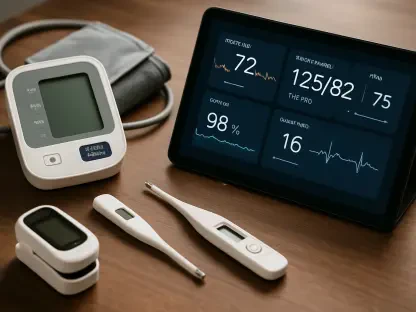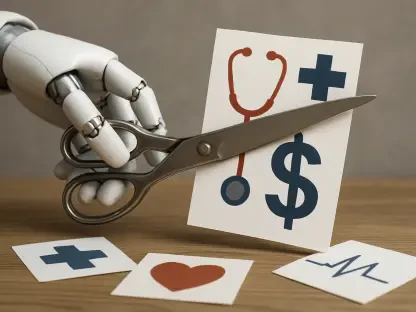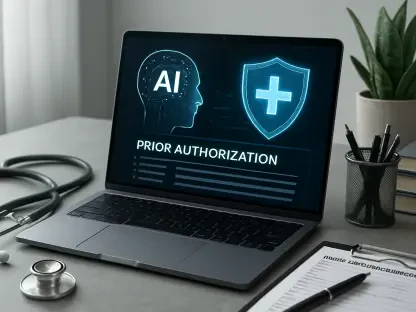Listen to the Article
Artificial Intelligence (AI) is already changing many work fields, and healthcare is one of them. But AI’s part in medicine is relatively fresh, and experts are still debating its role in the future. A study conducted in 2023 showed that many Americans are uncomfortable with their doctors using this technology to look after their health. Even though most people are worried about its risks, the use of AI in healthcare is growing. This makes it important for patients, doctors, and healthcare providers to understand both the advantages and the negative consequences associated with this tech.
There are two main kinds of AI now used in healthcare: predictive and generative. According to CNN wellness expert Dr. Leana Wen, the first one uses math and patterns to predict health results—useful in detecting the situations in which people need to go to the hospital, for instance. The latter, however, can put together a vast amount of data, sum up information, and even act to generate human-like interaction to explain things. Even though worries about the technology persist with both types, it keeps making big steps in health. To better understand this trend, you can start looking at the three main ways AI is changing the field.
Ai in Diagnostics and Predictive Medicine
One of the key uses of Artificial Intelligence in healthcare is to help doctors find out what is wrong with a patient and to predict what might happen next. AI-powered tools, mainly the ones that predict and analyze data from patients, such as past health records, lab tests, and scans, can help doctors spot illnesses better and faster than ever before.
For instance, OpenAI’s GPT-4 Turbo model has shown great skill in diagnosing illnesses, doing better than both doctors and former models. By checking older patient data, this tool can spot trends that may not be clear to human doctors right away. AstraZeneca has also developed a model that can spot early signs of illness. This allows doctors to step in sooner and help patients obtain better results. “We can pick up signatures in an individual that are highly predictive of developing diseases like Alzheimer’s, chronic obstructive pulmonary disease, kidney disease, and many others,” lead researcher Slavé Petrovski said.
AI-powered tools are great at analyzing medical images, too. They can now look at brain scans, X-rays, and Magnetic Resonance Imaging to detect different conditions, like tumors. In some cases, AI can do this even better than human doctors. This is really helpful in places with healthcare workforce shortages, making it easier for more people to get the care they need.
Ai for Administrative Efficiency and Clinical Productivity
Beyond diagnostics and predictive medicine, AI is changing how workers handle the administrative part of healthcare. Admin jobs like dealing with insurance claims, keeping track of patient files, and setting up visits can take a lot of time and money. Tools like clinical chatbots and auto record-keeping apps help make these tasks quicker, allowing healthcare staff to pay more attention to their patients.
A study by McKinsey & Co. shows that 40% to 57% of healthcare organizations use AI tools that make things run smoother. They can help with medical records, making the work easier for healthcare workers and reducing mistakes. AI-powered tools transcribe and sum up talks between patients and doctors, making sure the records are correct and saving valuable time.
Also, AI-based virtual assistants can deal with patient questions, set up appointments, and remind them to take their meds. This not only makes patients more involved in the process of managing their health, but it also lightens the burden on the staff.
Ai’s Role in Bridging Healthcare Gaps and Expanding Access
4.5 billion people globally still lack access to healthcare, and by 2030, the world may be short of 11 million healthcare workers. AI-powered tools could help fill these holes, making healthcare easy to access and more effective.
The technology is already reshaping healthcare by powering telemedicine and remote diagnostics. It can connect patients in far or less-served places to health pros, offering online help and live health tracking. For example, AI tools can assess when an ambulance is needed, assuring emergency medical services to those who need it.
In addition, chatbots and health assistants can give medical advice, sort out symptoms, and point to the right treatment options. These tools are especially effective in places with low healthcare support, where it can be difficult to find skilled medical help.
Also, AI is now used to bridge gaps in healthcare by making personalized treatment plans that fit individuals’ genetic makeup, way of life, and environmental factors. This type of precision medicine means that treatments are adapted to each person’s unique needs, improving overall results.
The Future of Ai in Healthcare
AI comes with numerous opportunities in healthcare, but it has some caveats. Data privacy, algorithm bias, and establishing the real accuracy of its results are all important issues to consider. When it comes to results, it may be important to remember that this technology always depends on how accurate and biased the data it learns from is. Its predictions can be wrong, especially if the data is flawed. There is also a chance that AI makes up information—leading to incorrect results.
Even with these issues, the technology is likely to play a bigger part in healthcare as time goes on. According to the World Economic Forum, the generative AI healthcare market will gain $2.7 billion in 2025, plus almost $17 billion by 2034. Because technology continues to evolve, healthcare providers must use a balanced strategy when it comes to adopting it. They will probably explore its powers while maintaining careful supervision to assure correctness and ethical use.
Conclusion
AI will continue to impact healthcare for years to come. It can improve diagnostics, simplify administrative work, and broaden healthcare access—transforming the field altogether. While patients will probably still worry about its implications, with careful implementation, they are likely to gain faith in the technology. Since it is constantly evolving, AI has the potential to quickly grow and become a pillar in any healthcare strategy, hoping to boost patient satisfaction and improve results.









